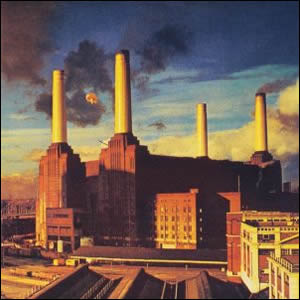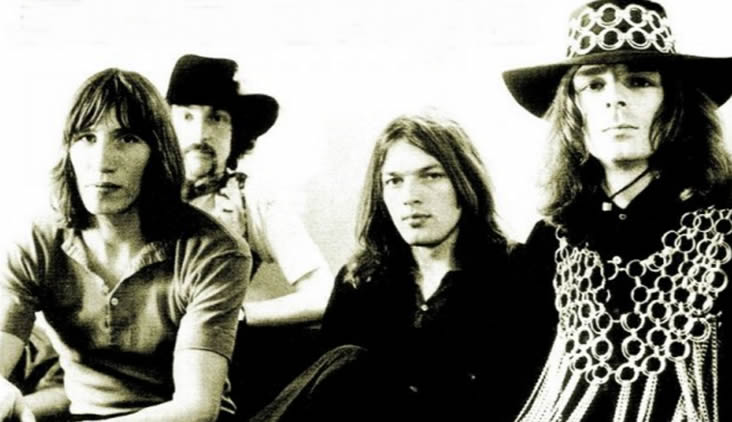Animals by Pink Floyd
 One of the more underrated classic albums, Pink Floyd‘s Animals is set up like an epic movie with three self-contained sub-chapters and sub-plots that somehow all tie together in the end. This latter fact is all the more remarkable when you consider that two of the three extended tracks were actually re-made versions of songs that were excluded from the band’s previous album, Wish You Were Here. The “concept” for the album was constructed by bassist and chief songwriter, Roger Waters, who used farm animals as analogies to represent differing personality types, much in the same fashion as fellow Englishman George Orwell used in his literary classic Animal Farm.
One of the more underrated classic albums, Pink Floyd‘s Animals is set up like an epic movie with three self-contained sub-chapters and sub-plots that somehow all tie together in the end. This latter fact is all the more remarkable when you consider that two of the three extended tracks were actually re-made versions of songs that were excluded from the band’s previous album, Wish You Were Here. The “concept” for the album was constructed by bassist and chief songwriter, Roger Waters, who used farm animals as analogies to represent differing personality types, much in the same fashion as fellow Englishman George Orwell used in his literary classic Animal Farm.
Beyond the lyrical content, the album is also very unique musically. It is the most hard-rock oriented of any Pink Floyd album of the era and is the last to have extended instrumental sections and 10-minute-plus tracks. In a sense it is a bridge between the total group albums of the past and the Waters-centric albums that dominated from the late seventies until Waters departure in 1984. Although Waters had written a large part of the band’s material on previous albums, guitarist David Gilmour had been the primary vocalist since replacing original member Syd Barrett in 1968. With Animals, the proverbial “torch” was passed as Gilmour only shared partial vocals on one song while Waters sang lead everywhere else.
The album’s theme was a reaction to the state of rock music just as the new, raw genre of punk began to explode in London. Part of requirements of this simplistic new movement was to rally against artists of longevity and Pink Floyd was a frequent target of such ire. Despite this, some members of the band welcomed this new movement as a return to the underground scene from which the band had grown.
Animals was, by most accounts, a very stressful album for most of the band, as each was focused on personnel or other interests with the exception of Waters, who happily took the reigns and molded the album in his image. Despite this, it is the band’s most sonically rewarding effort outside of The Dark Side of the Moon and consistently ranks near the top of the pack for the most avid Pink Floyd fans. Although this is not for the casual listener, for the true music lover, there is a very appealing “oddness” to this album which keeps its sound fresh through the decades.
 Animals by Pink Floyd |
|
|---|---|
| Released: January 23, 1977 (Columbia) Produced by: Pink Floyd Recorded: Britannia Row Studios, London, April-December 1976 |
|
| Side One | Side Two |
| Pigs On the Wing (Part 1) Dogs |
Pigs (3 Different Ones) Sheep Pigs On the Wing (Part 2) |
| Band Musicians | |
| David Gilmour – Guitars, Vocals Roger Waters – Bass, Vocals Richard Wright – Piano, Keyboards Nick Mason – Drums |
|
In 1974, Pink Floyd embarked on the “Wish You Were Here” tour, playing new material in advance of the 1975 album of the same name. Two of the songs played during that tour were ultimately left off that album and later re-written for Animals. One of these was a jazzy acoustic piece by Gilmour called “You Gotta Be Crazy” that was slowed down with re-written lyrics and renamed “Dogs”.
Right from the jump, “Dogs” is something unique and off the tracks even for the vast Pink Floyd catalog. With that progression of odd acoustic chords by Gilmour and just the right touch of organ and synth effects by keyboardist Richard Wright, the layered music builds with ever greater intensity as it progresses through the first three verses. When the first guitar lead breaks in, it is clear that this is a Gilmour signature song, with the slow progressions through the first instrumental break being one of the best Pink Floyd jam ever. The biting and cynical lyrics are a concoction the philosophies of Machiavelli, Sol Alinsky, and Vito Corleone, and offer no counter-weight in the pursuit of pure power. At about 8½ minutes in, there is a long synth and “dog barking” section, which I used to consider filler but have to appreciate in my old age, especially when you consider how completely transformed the song is on the other side. Waters is now singing and, even though the acoustic is strumming the same exact chords, the music contains a completely different vibe.
“Dogs” is also a back link from the future song “Hey You” on The Wall, with the whole concept of the bad blood “stone” being revisited in that song which introduces the concept of that album. With the outro “who was…” section that concludes this 17-minute piece, Waters borrows from the famous Alan Ginsberg poem “Howl” as he goes off into a tangent about himself in what is like a window into The Wall.
“Sheep” is the other track that dates back to the 1974 tour, when it was a mainly instrumental piece called “Raving and Drooling”. It is a driving, synth-heavy piece with a wild effect on Water’s voice trailing the verse lines. The lyrics are at once violent and scolding;
“Meek and obedient you follow the leader
Down well-trodden corridors into the valley of steel…”
The ten-plus-minute song contains a middle section which harkens back to “Dogs” by reviving the “stone” theme and effect before it progresses into a bizarre section that includes a re-written bible quote spoken by drummer Nick Mason through a heavy vocoder. It then bursts out into the climatic third verse where the “sheep” level their revenge against the “dogs”.
Animals is considered by many to be nihilistic, while others point to the two short pieces that bookend the album as an optimistic “wrapper” of hope. “Pigs On the Wing” is pure acoustic folk, like a slowed down Bob Dylan tune but with distinct vocals of Roger Waters. It was recorded as a single song with a guitar lead between the verses by the band’s touring second guitarist Snowy White. But in what turns out to be a rather shrewd and cunning move, Waters split the song into two parts of nearly equal length, omitting the guitar lead and also significantly increasing his album royalties as they were on a per-song basis. This move was deeply objected to by Gilmour who actually received half the royalties from his 17-minute piece “Dogs” than Waters received from this split song that was less than 3 minutes in total.

Not to be confused with “Pigs on the Wing”, “Pigs (Three Different Ones)” is the third major piece on the album. Musically is where this song really shines, especially the array of key parts performed by Wright along with the sharp, biting guitar crunches and cool sound effects throughout. The song also includes the world’s first and only “pig lead” as Gilmour using a talk box for some great effects during a long instrumental section. Lyrically, Waters takes aim at those with wealth and power, in what is really an updated version of “Us and Them” but with full concentration on the “Them”.
Following the release of Animals, the band embarked on their biggest tour to date, labeled the “In the Flesh” tour. This tour was Pink Floyd’s first experience with playing in large stadiums and they found themselves uncomfortable in such settings and much internal squabbling ensued. The tour also set the scene and setting for the story in the next album The Wall. That album would become vastly popular with a mainstream audience, something Animals would not achieve. Even so, Animals is a great album and totally unique among its rock n roll contemporaries.
~
Part of Classic Rock Review’s celebration of 1977 albums.





Singin’ Songs Across the Southland | River of Rock
April 13, 2017 @ 5:52 pm
[…] Animals by Pink Floyd – 45th Anniversary Peter Gabriel (1977) by Peter Gabriel – 40th Anniversary The Joshua Tree by U2 – 30th Anniversary Disciplined Breakdown by Collective Soul – 20th Anniversary Asia by Asia – 35th Anniversary Nine Lives by Aerosmith – 20th Anniversary Machine Head by Deep Purple – 25th Anniversary Whitesnake by Whitesnake – 30th Anniversary American Fool by John Cougars – 35th Anniversary […]
December 22, 2019 @ 11:04 pm
I got this as a Christmas gift from my now 78 year old mother on eight track in 1977. It shocked me how different it is from their previous albums. Much harder and more cynical. Comparing people to animals in one big dark allegory is brave stuff. Not very nice but who said reality and good art has to be. They could never match their Progressive Rock peers as musicians but their songeriting snd vision made up the difference. David Gilmore was brilliant on this album.
July 12, 2020 @ 2:28 pm
a great review. I agree totally, you nailed it!
January 30, 2021 @ 9:57 pm
What a Tripping phyidelice Rocknow an Rolling band.The best in the world. I think I’ve colamented this right.